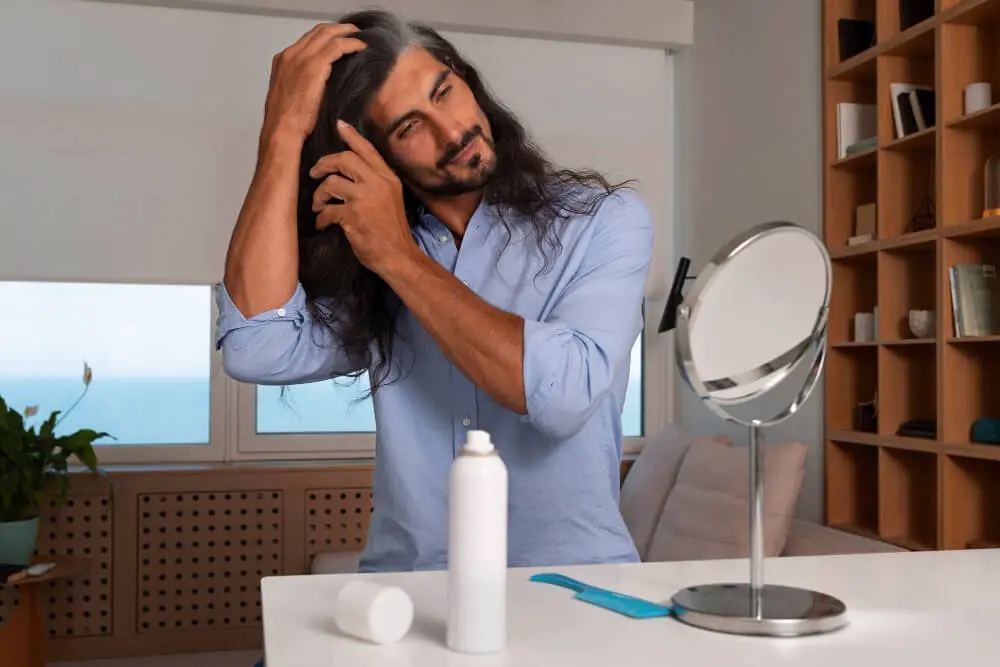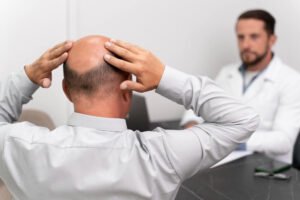Testosterone Replacement Therapy (TRT) has emerged as a savior for men combating the effects of aging. With its promise of revitalizing energy levels, enhancing muscle strength, and boosting libido, TRT has garnered attention and popularity. But as with any powerful solution, questions arise. Among the concerns echoing in the minds of those considering TRT is a perplexing query: Does TRT lead to hair loss? Let’s delve into this topic, exploring the intricate link between TRT and hair loss while unveiling strategies to maintain your luscious locks.
Unveiling Male Pattern Baldness
Imagine your hair as a well-tended garden, with each strand a precious bloom. Now, envision dihydrotestosterone (DHT) as the invasive weed threatening to overrun this beautiful garden. Male pattern baldness, scientifically known as androgenetic alopecia, embodies this scenario. It’s the gradual, permanent loss of hair, starting with receding hairlines and bald patches, eventually leading to reduced hair density. Genetic factors and DHT, a hormone derived from testosterone, are key players in this tale.
Decoding TRT: Friend or Foe of Hair?
TRT is like a fountain of youth, replenishing testosterone levels in men dealing with low-T. Crucially, TRT itself doesn’t initiate hair loss. The twist lies in DHT, a byproduct of testosterone metabolism. DHT attaches to hair follicles, gradually shrinking them and hampering hair growth.
Diving into DHT and Hair Loss
Picture DHT as a miniaturizing force, transforming once-robust hair follicles into weaker versions. This transformation is catalyzed by the 5 alpha-reductase enzyme, which converts testosterone into DHT. Just as water pressure shapes a garden hose, DHT influences the fate of your hair follicles.
The Dilemma: TRT and DHT
The introduction of TRT increases the available testosterone in your system, thereby amplifying DHT levels. It’s akin to turning up the water pressure in your garden hose. However, it’s important to note that the increase in DHT doesn’t stem directly from TRT but rather from the excess testosterone available for conversion.
Strategies to Combat Hair Loss during TRT
In the face of this dilemma, solutions emerge. Enter finasteride, a medication that inhibits the 5 alpha-reductase enzyme, curbing the conversion of testosterone into DHT. My personal journey with finasteride has showcased its effectiveness in slowing hair loss. Minoxidil, another contender, stimulates hair growth and improves blood flow to the scalp.
Bridging the Gap: Benefits vs. Hair Loss
The path forward brings us to a crossroads: the balance between the benefits of TRT and the potential for hair loss. As we navigate this junction, a thought arises—what’s the trade-off? Can a vibrant life coexist with a receding hairline? It’s a conundrum that each individual must weigh.
Embracing a Versatile Strategy
Fortunately, the options available to combat hair loss during TRT extend far beyond a single solution. Embracing a versatile strategy is key. Beyond medications, you can explore a range of alternatives, including incorporating essential vitamins, utilizing specialized shampoos, and even considering innovative laser therapy. This diverse array of choices empowers you to craft a personalized plan that resonates with your unique preferences and needs.
Expert Insights and Credible Sources
Expert voices echo the intricate dance between TRT and hair loss. Defy Medical and Wimpole Clinic offer valuable insights, shedding light on the nuanced relationship. But let’s not forget the foundation of science. The information presented is rooted in real scientific sources, ensuring accuracy and credibility.
Conclusion
As you venture into the world of TRT, navigating the terrain of potential hair loss becomes essential. Remember, TRT itself isn’t the antagonist—it’s the intricate dance between testosterone, DHT, and genetics that shapes the story. Armed with knowledge and an arsenal of solutions, you’re equipped to embark on this journey with confidence. So, as you embrace the benefits of TRT, also embrace the tools to safeguard your precious garden of hair.
Disclaimer: The information provided in this article is for informational purposes only and should not be considered as medical advice. Always consult with a qualified healthcare professional before making any decisions regarding your health or treatments. For more information, please read our Medical Disclaimer.
Frequently Asked Questions:
- Does Testosterone Replacement Therapy (TRT) directly cause hair loss?
No, TRT itself doesn’t directly cause hair loss. However, the hormone testosterone, which is involved in TRT, can lead to increased levels of dihydrotestosterone (DHT), a hormone linked to hair loss in individuals with a genetic predisposition. Hair loss occurs when DHT affects hair follicles’ growth cycle. - Can I undergo TRT if I’m genetically prone to hair loss?
Yes, you can still consider TRT if you’re genetically predisposed to hair loss. It’s important to be aware of the potential risk and take measures to manage it. Consult with a healthcare provider who can help you explore strategies to mitigate hair loss, such as using medications like finasteride and minoxidil. - Are there any TRT-friendly treatments to prevent or slow down hair loss?
Absolutely. Alongside TRT, you can adopt various treatments to address hair loss. Medications like finasteride and minoxidil can be effective in preventing hair loss by blocking DHT and promoting hair growth. Additionally, specialized shampoos, vitamin supplements, and innovative therapies like laser treatment can contribute to maintaining your hair health. - Is hair loss inevitable during TRT if I’m genetically susceptible?
Not necessarily. While genetic susceptibility to hair loss plays a role, it doesn’t mean hair loss is inevitable. By using a combination of preventive measures, including medications, lifestyle adjustments, and specific hair care routines, you can significantly slow down or even minimize the impact of hair loss caused by TRT. - Can women undergoing TRT experience hair loss?
Yes, women undergoing TRT can also experience hair loss, although it’s less common than in men. Like men, women’s hair loss during TRT is often related to an increase in DHT levels. If you’re a woman considering TRT and concerned about potential hair loss, discussing your options with a medical professional is essential to make informed choices.
References:
- Ho, C.H., Sood, T. & Zito, P.M. (2021, November 15). Androgenetic Alopecia. StatPearls.
- Kinter, K.J. (2022, March 9). Biochemistry, Dihydrotestosterone. StatPearls.
- Nassar, G.N. & Leslie, S.W. (2022, January 4). Physiology, Testosterone. StatPearls.
- Kaufman, K.D., et al. (1998, October). Finasteride in the treatment of men with androgenetic alopecia. Journal of the American Academy of Dermatology.
- Badri, T., Nessel, T.A. & Kumar, D.D. (2021, December 19). Minoxidil




